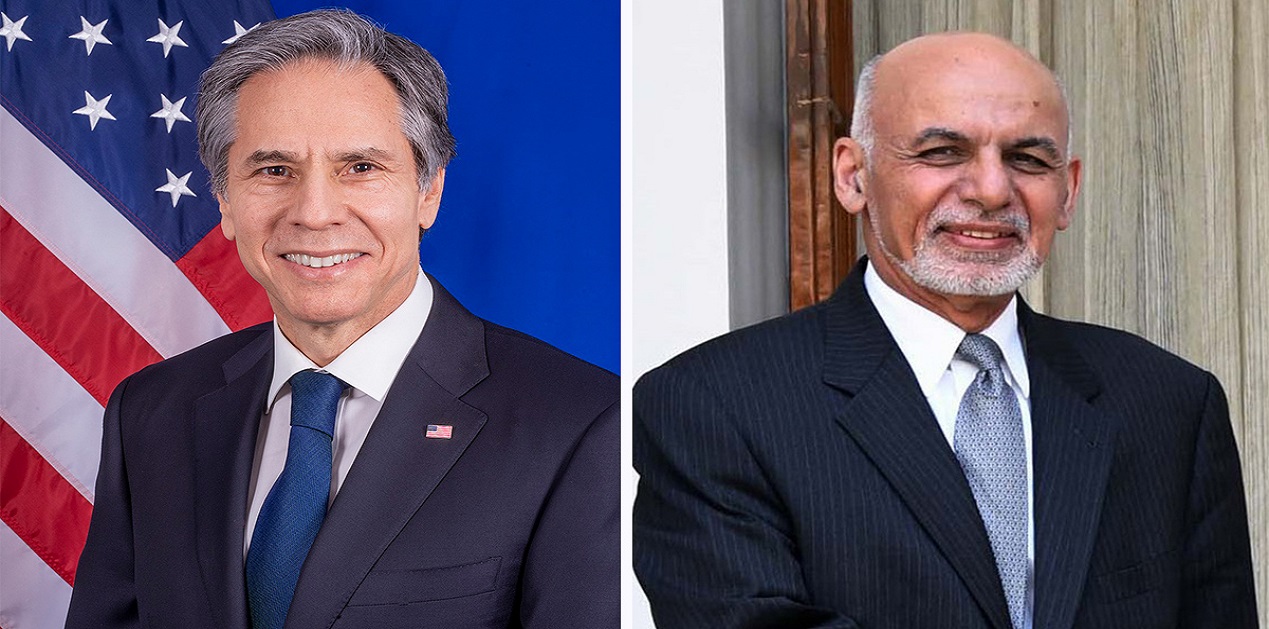February 2021 marked exactly one year since United States (US) and the Taliban signed “The Agreement for Bringing Peace to Afghanistan”, in a bid to end decades of war in the country. One of the key features of the agreement reached by the former US President Donald Trump administration was complete withdrawal of the last 2,500 US troops by May 1, 2021. President Joe Biden’s administration is now faced with a dilemma whether or not to stick to the time-line of the troop withdrawal set by his predecessor in its negotiation with the Taliban. In a recent television interview however, Biden criticized Trump’s deal with the Taliban as “not very solidly negotiated” and expressed that it will be “tough” for the US to withdraw from Afghanistan in the next six weeks.1
Earlier this month, the US Secretary of State Antony Blinken wrote a letter2 to the Afghan President Ashraf Ghani that provided a blueprint to accelerate the stalled peace process in Afghanistan. Some of the key recommendations in the letters were: First: A proposition for a UN facilitated meeting between foreign ministers of key regional stakeholders, including Russia, China, Pakistan, Iran, Indian and the US, in order to discuss common approach towards supporting the peace process in Afghanistan. Second US Special Envoy Zalmay Khalilzad to share a draft peace agreement with Kabul and the Taliban leadership to jumpstart discussions of ceasefire and a negotiated settlement. There is also a proposal for the creation of a transitional peace government, which will be a temporary arrangement until a new constitution and a permanent government are formed. Third, Washington proposed a high-level meeting between the Afghan government and the Taliban in Turkey to finalize the peace agreement. Lastly a new proposal to bring about a “reduction in violence” within ninety days.
Blinken’s letter leaked by an Afghan media house has been seen as the first roadmap that the Biden Administration has come up regarding Afghanistan. It was evident that significant stress is being given to a regional consensus on Afghanistan and it is important to ensure that there is a coordinated approach in formulating their political, economic and developmental contributions towards Afghanistan. Being India’s largest regional donor and a reliable friend of Afghanistan, India’s inclusion in draft plan is a significant development. As an important and immediate neighbour of Afghanistan with long standing relations, the inclusion of Iran in Washington’s scheme of things for Afghanistan was notable, but so was the omission of other important neighbours namely, Central Asian countries.
Why Turkey?
There have been lots of conjectures regarding the selection of Turkey as the new venue for the peace negotiations. Turkey is a major NATO ally from the Muslim worldand can monitor ceasefire compliance on the ground. It is capable of working closely with the US, which is trying to rejuvenate its ties with Ankara dented under the Trump administration. Turkey has good relations with Pakistan; the two formed a strategic alliance in the recent years. Ankara’s equations with Islamabad might give her the position to exert pressure on Taliban via Pakistan, if and when situation demands. Moreover, Turkey also hosts significant Afghan refugees and asylum seekers as a result has interest in the political situation in Afghanistan. While the rhetoric on all the sides indicate that these talks will not supplant the ones in Doha, yet eminent Afghanistan expert, Sultan Barakat has argued that moving the negotiations from Qatar to Turkey would not help the peace process since “the change is not backed by a request for formal mediation by the Afghan sides…The little progress made on the agenda since the beginning of talks (in Doha) was achieved only after the two sides accepted Qatar’s offer to facilitate between them.”3
Extension of the US withdrawal date?
It is evident that President Biden has to take a call quickly on whether or not the US troops in Afghanistan will return home from Afghanistan. Earlier, Secretary of Defence Lloyd Austin had indicated that there would be no “hasty or disorderly withdrawal that put US and NATO forces at risk” and had stressed on the progress of the intra-Afghan dialogue accompanied by a reduction in violence.4 Although six months behind in schedule from what was stated in the US-Taliban deal, the intra-Afghan negotiation began in Doha in September 2020 amidst soaring expectations and publicity, as it was seen as an historic opportunity to bring an end to Afghanistan’s decades long war and conflict. But the pace of the negotiations has been remarkably slow. The first round of talks ended in December only after the two sides agreed on some preliminary rules to set the tone of the negotiations. It was expected that the second round of the talks would actually tackle the range of critical issues involved. However, soon after the second round of talks began in January 2021, it got stalled for more than a month. Ever since the beginning of these talks a significant surge in violence, insurgency and targeting killings have been observed in Afghanistan. The need for a substantial push to the peace talks has been widely recognized. The political dispensation in Kabul under President Ghani expressed its willingness to initiate discussions on holding fresh elections in Afghanistan, insisting that any new government must emerge through a democratic process. Taliban spokesman Naeem Wardak confirmed a meeting between the armed group, Khalilzad and General Scott Miller, the head of US forces and the NATO-led non-combat Resolute Support mission, where both sides expressed their commitment to the full implementation of the Doha Agreement.5
Keeping the delay in the beginning of the intra-Afghan-negotiation, eminent scholar Bernett Rubin has forwarded a recommendation for the Biden Administration. He argued that “when the political negotiations envisioned by the Doha agreement were delayed, measures to remove sanctions on the Taliban and release thousands of Taliban detainees were delayed as well. As a result, an immediate U.S. withdrawal would leave Taliban prisoners in detention and an array of international sanctions against the group. This gives Washington an important source of leverage with the Taliban, who have long made international recognition and legitimacy a priority”6 - thereby making a case in favour of a six-month extension of the Doha timetable. Whether something on those lines will be accepted by all concerned parties remains to be seen.
Recently, Russia has also declared its plan to host a meeting with the Afghan government delegation, the Taliban representatives, the US, China, Pakistan and Qatar in Moscow to complement other international efforts to revive the deadlocked peace process in Afghanistan.7 Khalilzad who has been trying to drum up support for the draft proposal that included an interim government and ceasefire, will also be present at the Moscow talks.8 While President Biden would be keen to bring an end to its longest far and focus on other priorities such as the pandemic, climate change, arms control, and the U.S.-Iran nuclear deal, the path ahead in Afghanistan would be significantly difficult. There are bound to be contradictory views and conflicting and stern positions, how those can be reconciled in the days to come will be interesting to watch.
Endnotes
- “Biden says ‘tough’ to meet May 1 Afghanistan withdrawal deadline”. Al Jazeera, March 17, 2021. Available at:https://www.aljazeera.com/news/2021/3/17/biden-says-afghanistan-withdrawal-deadline-of-may-1-tough (Accessed on 18.3.2021)
- “Exclusive: US Secretary Antony Blinken in a letter to President Ghani--similar to one shared with Chairman Abdullah--presents four suggestions for Afghan peace process.” Tolo News Twitter Handle-@TOLOnews, March 7, 2021. Available at:https://twitter.com/TOLOnews/status/1368523273114419203?ref_src=twsrc%5Etfw%7Ctwcamp%5Etweetembed%7Ctwterm%5E1368523273114419203%7Ctwgr%5E%7Ctwcon%5Es1_&ref_url=https%3A%2F%2Fwww.aljazeera.com%2Fnews%2F2021%2F3%2F7%2Fblinken-proposes-plan-to-accelerate-peace-process-in-afghanistan
(Accessed on 18.3.2021) - Sultan Barakat, “New US Plan may erase progress made in Doha”. Al Jazeera, March 12, 2021. Available at:https://www.aljazeera.com/opinions/2021/3/12/the-new-us-roadmap-could-erase-decades-of-progress-in-afghanistan (Accessed on 18.3.2021).
- “The US will not undertake a hasty or disorderly withdrawal from Afghanistan, Says Defence Secretary Lloyd Austin”. BusinessLink, Feb 21. 2021. Available at: https://www.thehindubusinessline.com/news/world/the-us-will-not-undertake-a-hasty-or-disorderly-withdrawal-from-afghanistan-says-defence-secretary-lloyd-austin/article33885769.ece(Accessed on 18.3.2021)
- “US says decision unclear on May 1 ‘force posture’ in Afghanistan”. AL Jazeera, March 8, 2021. Available at:https://www.aljazeera.com/news/2021/3/8/us-says-decision-unclear-on-may-1-force-posture-in-afghanistan(Accessed on 18.3.2021)
- Barnett Rubin, “How to bargain with the Taliban”.War on the Rocks, February 19, 2021.Avaialable at: https://warontherocks.com/2021/02/how-to-bargain-with-the-taliban/(Accessed on 18.3.2021)
- Russia to host Afghanistan meet to advance intra-Afghan talks”. AL Jazeera, March 10, 2021. Available at: https://www.aljazeera.com/news/2021/3/10/russia-to-host-afghanistan-meet-to-advance-inter-afghan-talks (Accessed on 18.3.2021)
- “US Special envoy to attend Afghan peace Talks in Moscow”. AL Jazeera, March 15, 2021. Available at:https://www.aljazeera.com/news/2021/3/15/us-special-envoy-to-attend-afghan-peace-talks-in-moscow (Accessed on 18.3.2021)
(The paper is the author’s individual scholastic articulation. The author certifies that the article/paper is original in content, unpublished and it has not been submitted for publication/web upload elsewhere, and that the facts and figures quoted are duly referenced, as needed, and are believed to be correct). (The paper does not necessarily represent the organisational stance... More >>
Image Source: https://static.theprint.in/wp-content/uploads/2021/03/re-7.jpg










Post new comment